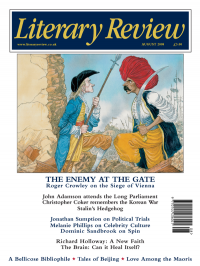Alan Rafferty
Brick Vs Brill
Man in the Dark
By Paul Auster
Faber & Faber 160pp £14.99
In the early Nineties Paul Auster staged a literary kidnapping or – the phrase he prefers – a ‘trans-fictional marriage’. He took a character from a novel by his wife, Siri Hustvedt, and wedded her to the protagonist of his then-inchoate book Leviathan. Much might be read into this about the relationship between the two writers. Although Hustvedt is well regarded, Auster is more highly acclaimed and sells more books; many readers of both assumed that Hustvedt had borrowed Auster’s character – that her work was derivative of his. However, what might seem to be literary bullying was, in Hustvedt’s view, anything but. She has explained that ‘I always thought it was nice that she ended up in another book, actually doing quite well. I had that nice feeling that Paul had saved her.’
Hustvedt might also have pointed out that when Auster borrowed her creation he was indulging one of his chief literary habits – switching people in and out of different stories. In previous novels Auster has borrowed figures from Poe, Hawthorne and, most often, his own oeuvre. But what he enjoys

Sign Up to our newsletter
Receive free articles, highlights from the archive, news, details of prizes, and much more.@Lit_Review
Follow Literary Review on Twitter
Twitter Feed
Under its longest-serving editor, Graydon Carter, Vanity Fair was that rare thing – a New York society magazine that published serious journalism.
@PeterPeteryork looks at what Carter got right.
Peter York - Deluxe Editions
Peter York: Deluxe Editions - When the Going Was Good: An Editor’s Adventures During the Last Golden Age of Magazines by Graydon Carter
literaryreview.co.uk
Henry James returned to America in 1904 with three objectives: to see his brother William, to deliver a series of lectures on Balzac, and to gather material for a pair of books about modern America.
Peter Rose follows James out west.
Peter Rose - The Restless Analyst
Peter Rose: The Restless Analyst - Henry James Comes Home: Rediscovering America in the Gilded Age by Peter Brooks...
literaryreview.co.uk
Vladimir Putin served his apprenticeship in the KGB toward the end of the Cold War, a period during which Western societies were infiltrated by so-called 'illegals'.
Piers Brendon examines how the culture of Soviet spycraft shaped his thinking.
Piers Brendon - Tinker, Tailor, Sleeper, Troll
Piers Brendon: Tinker, Tailor, Sleeper, Troll - The Illegals: Russia’s Most Audacious Spies and the Plot to Infiltrate the West by Shaun Walker
literaryreview.co.uk